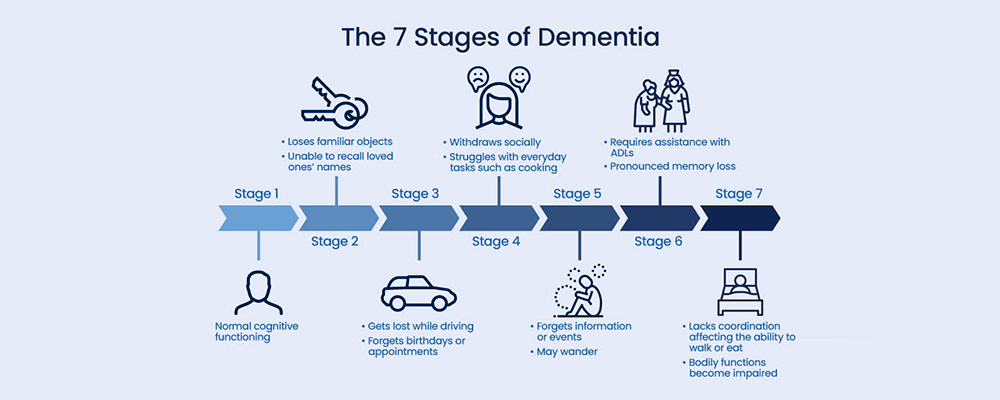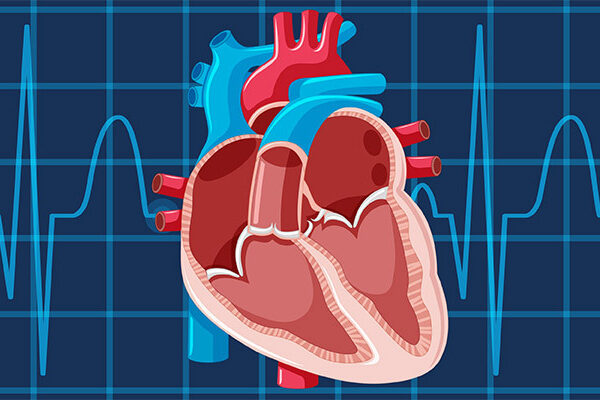Last Updated on November 22, 2023
Understanding FAST Scale Dementia
Dementia is a progressive disorder marked by a decline in cognitive function including logical thinking, reasoning, and the ability to remember things and events. Contrary to popular belief, it is not a normal part of aging and requires proper investigation and treatment to manage the condition. As discussed, dementia is a progressive disorder that happens in stages varying from mild to severe. The diagnosis and treatment of dementia is quite straightforward. Doctors use certain assessment tools to diagnose the condition, one of which is the FAST scale dementia tool. It helps evaluate the progression of Alzheimer’s disease in an individual.
In this blog, we will walk you through the stages of dementia and the use of FAST scale dementia.
Stages of Dementia
The FAST scale is a tool developed by Dr. Reisberg and is also called the Reisberg Functional Assessment Staging (FAST). FAST scale dementia is a meticulous tool that evaluates the progression of Alzheimer’s disease. The instrument has long been in the game and has been used on people who have Alzheimer’s disease for less than 6 months.
In this section, we will be discussing the stages of dementia that enlighten us about the progression and cognitive decline in dementia.
| STAGE 1 | Normal functioning adult | No cognitive impairment |
|---|---|---|
| STAGE 2 | Normally functioning senior adult | Common decline constant with age |
| STAGE 3 | Early dementia | Difficulty following complex tasks and some forgetfulness |
| STAGE 4 | Mild dementia | Frequent forgetfulness and issues with tasks |
| STAGE 5 | Mid stage dementia | Challenges with daily living tasks and can no longer live alone |
| STAGE 6 | Moderately severe dementia | Needs 24/7 supervision and assistance |
| STAGE 7 | Severe dementia (end-stage) | Near complete loss of physical and communication abilities |
Diagnostic Tools for Dementia
There are various dementia rating scales that are in use for assessing the progression of dementia. Some of which are listed below:
- GDS — Global Deterioration Scale
- FAST — Functional Assessment Staging Test
- CDR — Clinical Dementia Rating Scale
Scales like GDS and CDR focus on cognitive decline whereas the FAST scale emphasizes the ability to perform daily tasks. We all know that Alzheimer’s disease happens in stages — early or mild stage, middle stage, and late stage. FAST scale dementia probes deeper into each stage and gives detailed descriptions of them. Dementia journey is broken down into 7 stages that were discussed in the above section.
Here is a comprehensive description of each stage:
Stage 1:
The individuals with stage 1 are healthy adults with normal mental abilities.
Stage 2:
This stage is described as ‘’normal-aged forgetfulness.’’ Memory lapses are common at this stage and individuals have trouble focusing and struggle to choose the right words.
Stage 3:
Faint signs of mild cognitive impairment are observed by close relatives and friends. The ability to concentrate is also hampered and the affected individual may find it challenging to perform complex tasks.
Stage 4:
At this stage most individuals get the diagnosis of dementia. Cognitive impairment is very visible, and the individuals find it hard to handle things on their own such as preparing meals or paying bills.
As per the FAST scale dementia, this stage is also called the early stages of dementia.
Stage 5:
At this stage the individual loses their ability to live independently. Problematic behaviors are at a peak in this stage such as confusion, hallucinations, wandering, etc. At this stage the person will require full time assistance.
Stage 6:
This stage is considered the beginning of late-stage dementia. The affected person will become very dependent on their caregivers and require full-time assistance with everything.
Stage 7:
This is the last stage of cognitive disease. Communication and physical activity will become impossible, and the body will start to shut down, eventually resulting in the individual’s passing away.
How is FAST Scale Helpful?
The FAST scale dementia is interesting in that, if the individual has Alzheimer’s disease, whatever changes they encounter will be in sequence – that is, FAST stages will not be skipped over. If a person loses specific abilities listed at a “later” stage but retains abilities from an “earlier” stage (for example, if they can still dress and choose clothes but have very slight memory loss), their problems are not caused by Alzheimer’s disease. This is really helpful because it implies that their situation may be curable.
A Word from Revive Research Institute
Revive Research Institute is a strong advocate of good mental health. We are committed to expanding our therapeutic landscape and helping communities gain access to healthcare. We are currently conducting Alzheimer’s disease clinical trials to help people suffering from gradual memory loss that not only affects them but also their caregivers.
End Note
Despite Alzheimer’s being a progressive disease, the FAST scale tool can be of great help in managing the symptoms by early detection of each stage. FAST scale dementia is now the most commonly used tool for assessing the progression of the disease. It is important to keep an eye on the progressing symptoms and seek help if needed.





